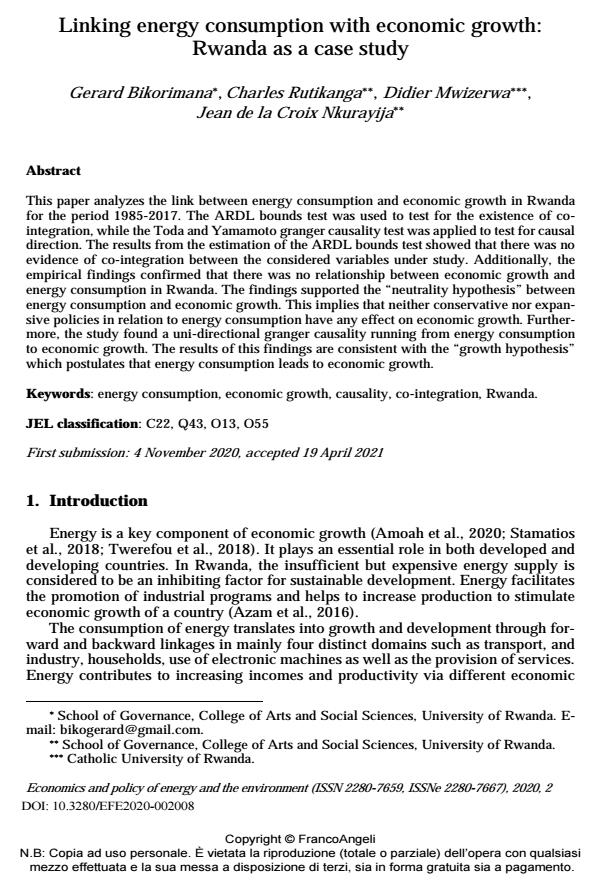Linking energy consumption with economic growth: Rwanda as a case study
Titolo Rivista ECONOMICS AND POLICY OF ENERGY AND THE ENVIRONMENT
Autori/Curatori Gerard Bikorimana, Charles Rutikanga, Didier Mwizerwa
Anno di pubblicazione 2021 Fascicolo 2020/2
Lingua Inglese Numero pagine 20 P. 181-200 Dimensione file 410 KB
DOI 10.3280/EFE2020-002008
Il DOI è il codice a barre della proprietà intellettuale: per saperne di più
clicca qui
Qui sotto puoi vedere in anteprima la prima pagina di questo articolo.
Se questo articolo ti interessa, lo puoi acquistare (e scaricare in formato pdf) seguendo le facili indicazioni per acquistare il download credit. Acquista Download Credits per scaricare questo Articolo in formato PDF

FrancoAngeli è membro della Publishers International Linking Association, Inc (PILA), associazione indipendente e non profit per facilitare (attraverso i servizi tecnologici implementati da CrossRef.org) l’accesso degli studiosi ai contenuti digitali nelle pubblicazioni professionali e scientifiche.
This paper analyzes the link between energy consumption and economic growth in Rwanda for the period 1985-2017. The ARDL bounds test was used to test for the existence of co-integration, while the Toda and Yamamoto granger causality test was applied to test for causal direction. The results from the estimation of the ARDL bounds test showed that there was no evidence of co-integration between the considered variables under study. Additionally, the empirical findings confirmed that there was no relationship between economic growth and energy consumption in Rwanda. The findings supported the "neutrality hypothesis" between energy consumption and economic growth. This implies that neither conservative nor expansive policies in relation to energy consumption have any effect on economic growth. Furthermore, the study found a uni-directional granger causality running from energy consumption to economic growth. The results of this findings are consistent with the "growth hypothesis" which postulates that energy consumption leads to economic growth
Parole chiave:Energy consumption, economic growth, causality, co-integration, Rwanda
Jel codes:C22, Q43, O13, O55
- Nexus between renewable-disaggregated non-renewable energy consumption and economic growth in GCC countries: a Cobb-Douglas production function analysis Ebrahim Abbas Abdullah Abbas Amer, Zhang Xiuwu, Ebrahim Mohammed Ali Meyad, Mohammed Muneer Alareqi, SAMEER. M. H. BATHER, Amr Abdelwahed, in Humanities and Social Sciences Communications 1097/2025
DOI: 10.1057/s41599-025-05041-1
Gerard Bikorimana, Charles Rutikanga, Didier Mwizerwa, Linking energy consumption with economic growth: Rwanda as a case study in "ECONOMICS AND POLICY OF ENERGY AND THE ENVIRONMENT" 2/2020, pp 181-200, DOI: 10.3280/EFE2020-002008